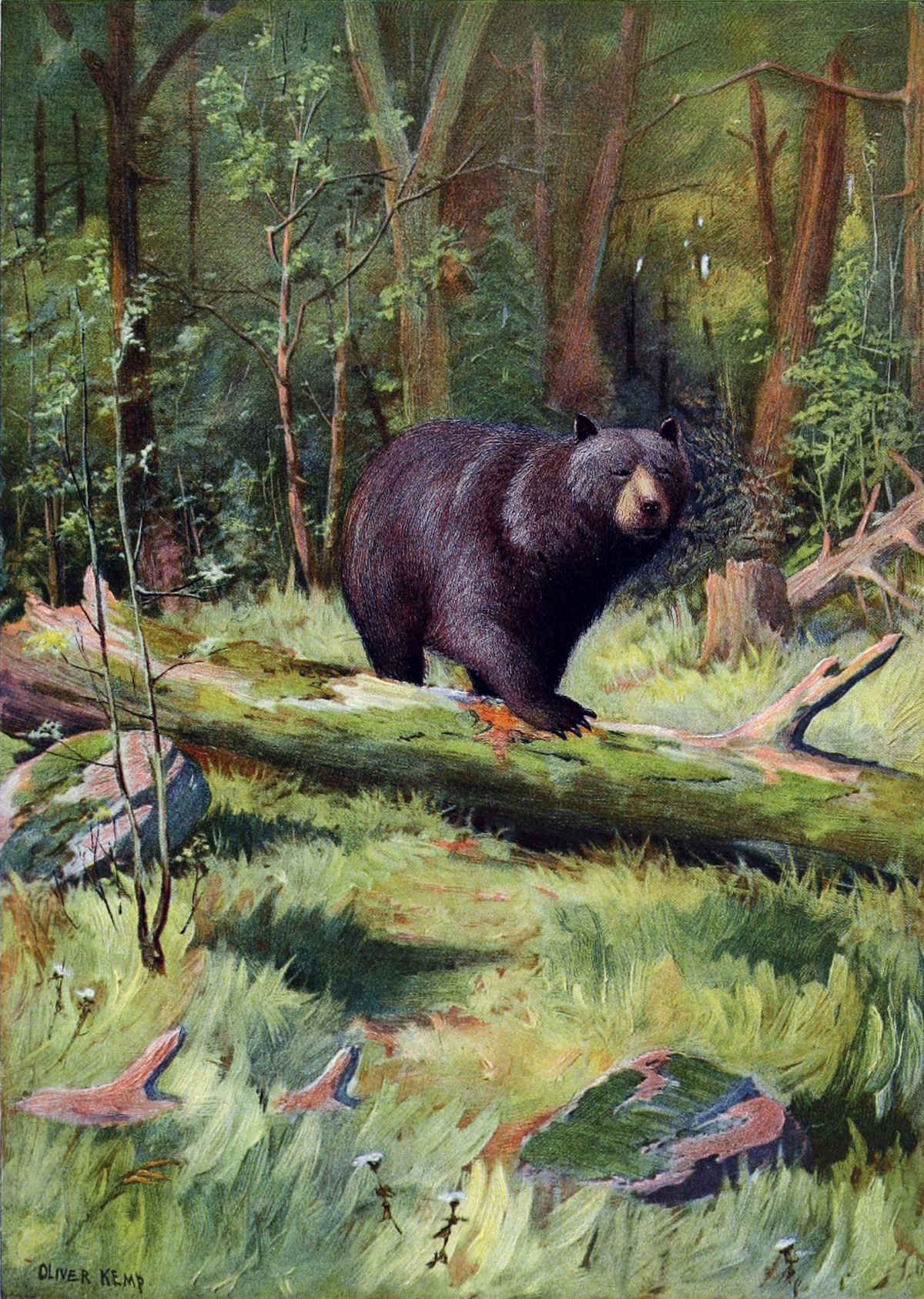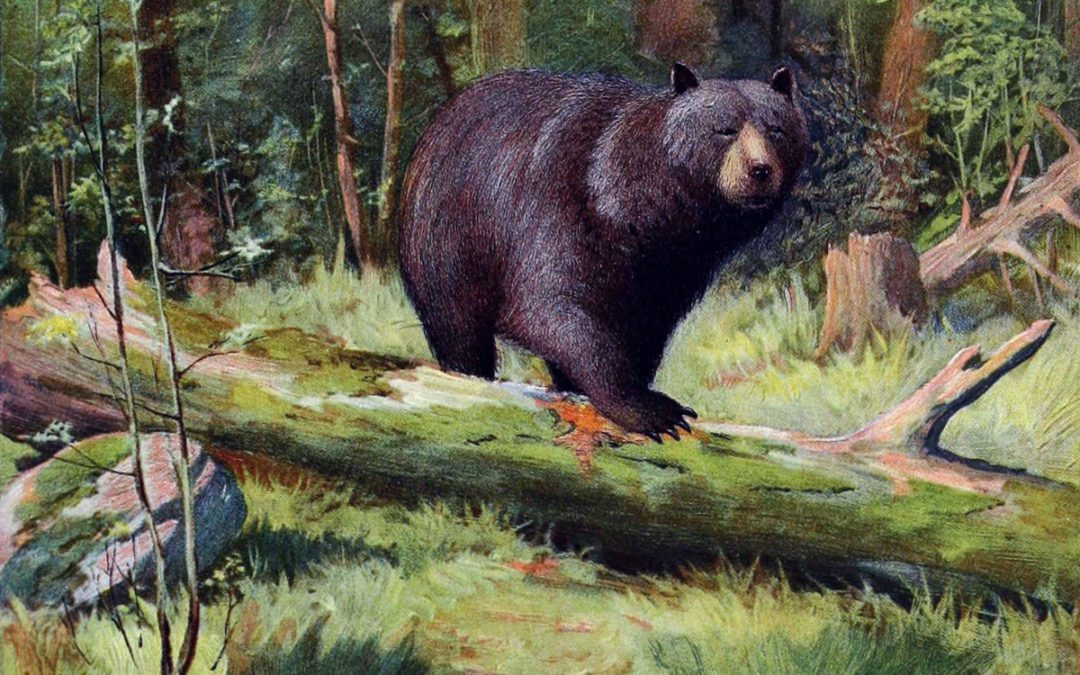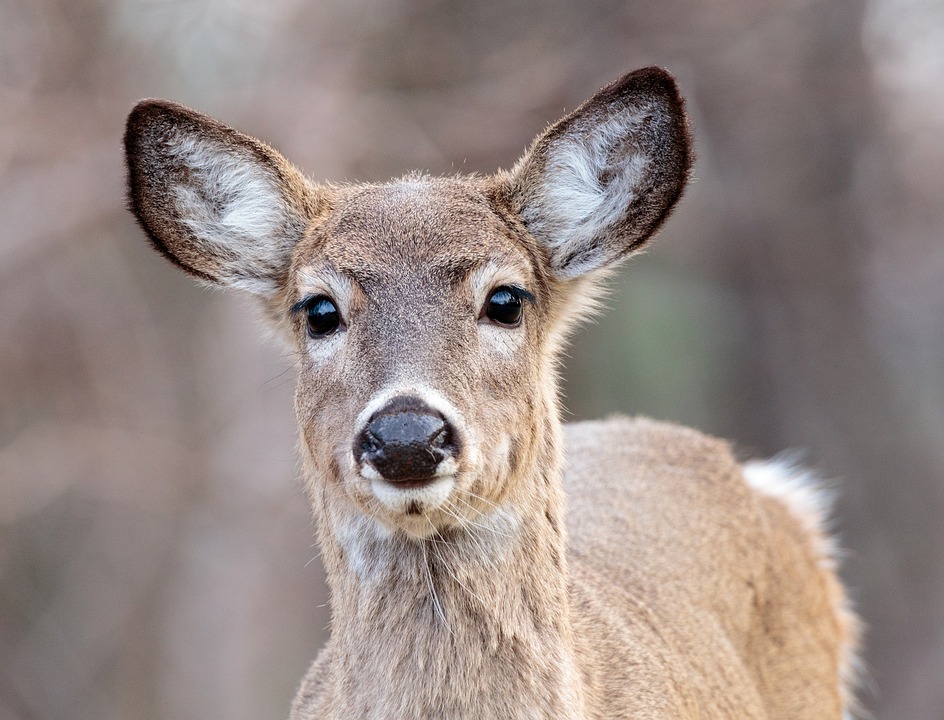This is an excerpt from an article that originally appeared in the August 1910 issue of Outing magazine.
Often, it is my custom to make careful pencil sketches of the characteristic rocks and growth of a locality, and from time to time an adventure is the result of the quiet and waiting. On a remote lake in Maine, two deer were feeding at the water’s edge, and just beyond them in the taller grasses a flock of ducks. There was a blue heron on the opposite shore that moved with stately grace or slanted his long neck like lightning after an incautious frog.
My attention was attracted by a movement in the bushes at the foot of the pond, and watching carefully, I made out a dark object stalking through the underbrush. As it came nearer I reckoned it to be a bear, and in the gathering dusk he looked to be of unusual size. I decided to try a shot.

The Bear by Oliver Kemp.
There was a small clearing ahead, and when he crossed, this would be my time to fire. Cautiously I threw the lever of my rifle and watched the approach. When the bear reached the clearing, however, he crouched down behind a hillock and worked his way toward a fallen tree. I sighted carefully, and as he emerged I was about to fire when I observed that, once past the log, I was sure of a wide-open shot. Now a curious performance took place. I could see his head plainly over the log. But what was he doing?
Crack! A rifle shot rang out from the bear’s position, and one of the deer dropped, struggling in the water. My heart stood still. Then the individual rose to an erect position and came around dressed in fur coat and cap. The hunter had left his team in the tote road to crawl on all fours along the shore of the pond.
Such an experience is trying, and the effort to speak your mind is fully too much. You struggle a little, hopelessly, but the words weren’t made. However, in this case a great light seemed to dawn after a very little explanation.
This was the exception. When I speak of adventures, I have in mind the entertainment afforded by the “small folk,” many of whom seem filled with curiosity at the sight of an artist at work, and of them all, the red squirrel is my friend. Never have I had such enthusiastic appreciation as he invariably voices. The whisky jack is a close second, though somewhat critical. But the skunk is a cynic.
I recall a certain cold morning in the Smoky Mountains. The men with the hounds had gone down the valley to pick up the trail of a foraging bear that had run in from Tennessee to gather such mast as acorns, beech, and hickory nuts. There followed an interval of waiting that was worthwhile, for always there is a homelike feeling in the Southern mountains. It was pleasant to sit there and absorb it, listening the while, expectantly, for the baying of the hounds. The gray squirrels were friendly, and a groundhog nearby was busily at work sinking a shaft and dodging with a shrill whistle when the big hawks flew by. Once, across an opening a long way off, I made out a slow-moving procession of wild turkeys.
There was a rustle close by, and there sat a skunk eying my outfit critically. I must have struck him as an amusing sight—altogether too funny, in fact—because he spun round and round in his glee. He waltzed toward me on his toes and threw a few cartwheels, then climbed to a seat beside me on the rock for a more sober view of my drawing. It was a little better than his first glance caused him to think, so he sat down for deliberation.
Now a very little of such company suffices, say five or even ten minutes. After that it seems like carrying the matter too far.
Something told me that this was the psychological moment for the bear hunt proceedings to get well underway, and, as if in answer, from down in the valley there came the far-off baying of the hounds. It was trying; you will understand that all this time I was sitting very quietly. A spider crawled up my hunting coat and down the neck of my collar. Immediately I began to itch in upwards of 40 places. I would have given my chance on the bear gladly for just one soul-satisfying scratch, but any movement spelt disaster.

Dangerous Crossing by Oliver Kemp.
Meantime the chase was drawing near, and I confess to having grown nervous and somewhat peevish.
An incident that occurred in the West came to my mind. I was sitting on a soapbox near the tent and painting most industriously. A movement at my feet caused me to look down, and there was a good, fat rattler coiling himself into a comfortable twist.
It’s astonishing how instantly the human nerves react to a deadly snake. This chap didn’t buzz, but my nerves reacted just right, and the celerity with which I simultaneously shot up into space and slammed the box down over the beast has since been a source of wonderment to me.
But that didn’t help this matter with my black-and-white visitor. There wasn’t any soapbox here—just him and me looking at the picture. Suddenly the skunk left—perhaps it was the dogs. At any rate, I was pretty soon comfortable again.
There was still time to give some attention to the main business at hand, and by hard scrambling I managed to head off the bear just as he emerged from a clump of laurels.




